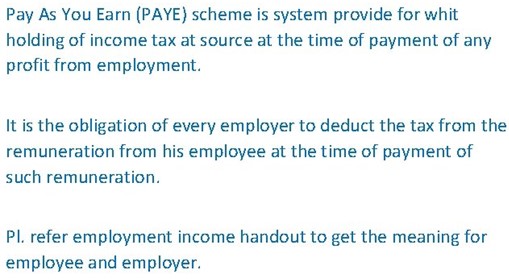1.8 PAYE (Pay-As-You-Earn)

PAY AS YOU EARN
All it really means is that you are paying the tax you owe to SARS on a monthly basis instead of all at once at the end of the tax year, hence PAYE means 'Pay As You Earn'.
The amounts deducted or withheld must be paid by the employer to SARS on a monthly basis, by completing the Monthly Employer return (EMP201). The EMP201 is a payment return in which the employer declares the total payment together with the allocations for PAYE, SDL, UIF and/or Employment Tax Incentive (ETI), if applicable. A unique Payment Reference Number (PRN) will be pre-populated on the EMP201, and will be used to link the actual payment with the relevant EMP201 payment declaration.

It must be paid within seven days after the end of the month during which the amount was deducted. If the last day for payment falls on a public holiday or weekend, the payment must be made on the last business day before the public holiday or weekend.
Note: Employers who pay, or are likely to pay Employees’ Tax exceeding R10 million in any 12-month period, must submit Employees’ Tax declarations and make payments electronically.
The responsibility of the employer in respect of a deceased employee.

Tasks
Watch the following video to gain more insight into pay-as-you-earn:
Paragraph 13(2)(b) of the Fourth Schedule to the Income Tax Act provides that an employer, who ceased to be an employer in relation to an employee, for example when an employee dies, is required to deliver an employees’ tax certificate within 14 days of the date on which employment ceased to the former employee (or to such deceased employee’s representative).
The employer must therefore deliver an employees’ tax certificate within 14 days after the employee passed away. The employer is required to provide the employees’ tax certificate to the executor acting as the representative taxpayer of the deceased employee.
The provisions of paragraph 14(5) of the Fourth Schedule that states the employees’ tax certificate shall not be delivered until the EMP501 reconciliation was submitted to SARS is not applicable to the circumstances envisaged under paragraph 13(2)(b). An employer must therefore, in the case of an employee’s death, provide the employees’ tax certificate even if the reconciliation is not yet submitted.

The executor, as the representative taxpayer, is responsible to finalise the financial and tax affairs of the deceased employee efficiently and without any unnecessary delays. The executor should therefore ensure that the necessary documentation, like the employees’ tax certificate is obtained from the deceased’s employer.
Note: The provisions of paragraph 13(2)(b) also apply in the case of an employee who retired or resigned. The employer must ensure that the employees’ tax certificate is provided to the employee within 14 days after resignation or retirement. If the employer fails to provide the employees’ tax certificates, the employee must request it from the employer.